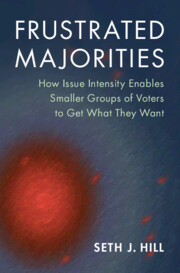Book contents
- Frontmatter
- Contents
- Figures
- Tables
- Theorems
- Acknowledgments
- Part I Frustrated Majorities, Issue Intensity, and Political Action
- Part II Argument: an Intensity Theory of Electoral Competition
- Part III Evidence: Empirical Patterns and Intensity Theory
- Part IV Conclusions
- 11 Conclusion: Implications for Representative Democracy and the Study of Politics
- Part V Appendices
- Bibliography
- Index
- Other books in the series
11 - Conclusion: Implications for Representative Democracy and the Study of Politics
from Part IV - Conclusions
Published online by Cambridge University Press: 15 September 2022
- Frontmatter
- Contents
- Figures
- Tables
- Theorems
- Acknowledgments
- Part I Frustrated Majorities, Issue Intensity, and Political Action
- Part II Argument: an Intensity Theory of Electoral Competition
- Part III Evidence: Empirical Patterns and Intensity Theory
- Part IV Conclusions
- 11 Conclusion: Implications for Representative Democracy and the Study of Politics
- Part V Appendices
- Bibliography
- Index
- Other books in the series
Summary
In this concluding chapter I summarize the theoretical and empirical results, provide a recipe to apply intensity theory in new settings, revisit and speculate about model assumptions, suggest five key implications for our understanding of representation, electoral competition, and political action, discuss the potential importance of issue intensity for the dynamics of policy change, and offer concluding thoughts.
Keywords
- Type
- Chapter
- Information
- Frustrated MajoritiesHow Issue Intensity Enables Smaller Groups of Voters to Get What They Want, pp. 165 - 176Publisher: Cambridge University PressPrint publication year: 2022

